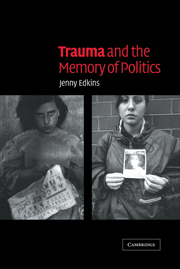Book contents
- Frontmatter
- Contents
- List of illustrations
- Preface
- 1 Introduction: trauma, violence and political community
- 2 Survivor memories and the diagnosis of trauma: the Great War and Vietnam
- 3 War memorials and remembrance: the London Cenotaph and the Vietnam Wall
- 4 Concentration camp memorials and museums: Dachau and the US Holocaust Memorial Museum
- 5 Testimony and sovereign power after Auschwitz: Holocaust witness and Kosovo refugees
- 6 Conclusion: the return of the political – the memory of politics
- Bibliography
- Index
5 - Testimony and sovereign power after Auschwitz: Holocaust witness and Kosovo refugees
Published online by Cambridge University Press: 05 October 2013
- Frontmatter
- Contents
- List of illustrations
- Preface
- 1 Introduction: trauma, violence and political community
- 2 Survivor memories and the diagnosis of trauma: the Great War and Vietnam
- 3 War memorials and remembrance: the London Cenotaph and the Vietnam Wall
- 4 Concentration camp memorials and museums: Dachau and the US Holocaust Memorial Museum
- 5 Testimony and sovereign power after Auschwitz: Holocaust witness and Kosovo refugees
- 6 Conclusion: the return of the political – the memory of politics
- Bibliography
- Index
Summary
Since Auschwitz all men, Jews (and) non-Jews, die differently: they do not really die; they survive death, because what took place – back there – without taking place, death in Auschwitz, was worse than death.
– Sarah KofmanIn the face of the horror of the Nazi concentration camps, there is a temptation to retreat into the comfort of easy solutions to the question of memory. There are several ways of doing this, as we saw in the last chapter. One is to represent what happened in a linear narrative – the historical account of the Holocaust. Museums like the US Holocaust Memorial Museum in Washington or exhibits like that at the Imperial War Museum in London attempt to present such a narrative: a coherent story that promotes a clear moral message. They focus on historical accuracy, displaying authentic artefacts to back up their claims to irrefutability. Historical research in its search for the truth about the events of the National Socialist persecutions can appear obsessed with factual detail, evidence and proof, particularly in the face of those who would deny that anything called ‘the Holocaust’ ever took place. There is a reassuring assumption that a historical narrative based on firm evidence can lead to a form of closure, a final solution to outstanding questions.
- Type
- Chapter
- Information
- Trauma and the Memory of Politics , pp. 175 - 214Publisher: Cambridge University PressPrint publication year: 2003



